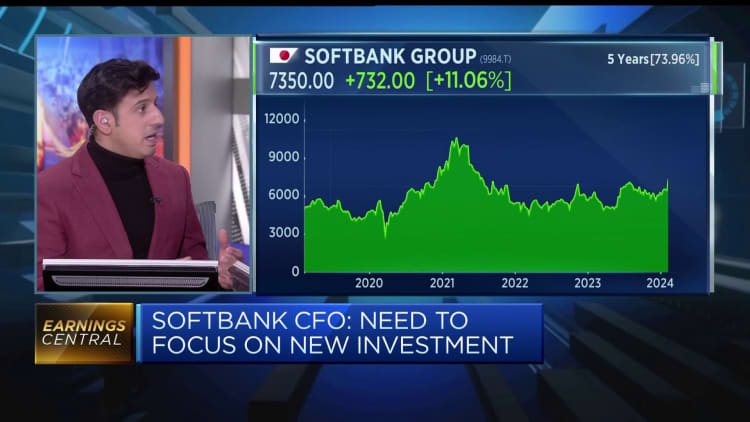
SoftBank posted its biggest gain in nearly three years at the flagship tech investment arm, the Vision Fund, in the December quarter amid a recovery in valuation of technology companies.
Here's how SoftBank did in the December quarter against LSEG estimates:
- Net sales: 1.77 trillion Japanese yen ($11.9 billion) versus 1.8 trillion Japanese yen expected.
- Net income: 950 billion Japanese yen versus 196.5 billion yen expected.
The Vision Fund logged a gain on investment of 600.7 billion Japanese yen, continuing a recovery after record losses in the previous fiscal year. That gain is the highest since the March 2021 quarter when the Vision Fund posted a 3.59 trillion yen gain.
SoftBank's net income was also the first first quarterly profit after four straight losses.
SoftBank's flagship tech investment arm had a rough time in the fiscal year that ended in March last year, posting a record loss of around $32 billion amid a slump in tech stock prices and the souring of some of the business' bets in China.
Vision Fund has posted gains in the last three quarters.
SoftBank also said it saw rising valuations from two major firms that the Vision Fund invests in, Chinese ride-hailing app Didi and TikTok owner ByteDance.
In the June quarter of 2023, the Vision Fund posted its first investment gain in five consecutive quarters, signalling early signs of fresh growth that coincided with recoveries in the prices of technology stocks.
In 2022, SoftBank founder Masayoshi Son said the firm would go into "defense" mode, slowing the pace of its investment and adopting a more cautious approach. In June, Son flagged a shift into "offense" mode, touting his excitement around the potential of artificial intelligence technology. Vision Fund is exposed to AI through investments in companies like China's SenseTime.
Arm boost
SoftBank said in the December quarter that it booked an investment gain of $5.5 billion thanks to the sale of shared of its majority-owned chip designer Arm to one of the Japanese firm's wholly-owned subsidiary.
Arm went public in the U.S. last year. The British firm was acquired by SoftBank in 2016 for around $32 billion at the time, and an initial public offering of Arm valued the company at over $50 billion.
Ahead of the earnings report, SoftBank's Tokyo-listed shares closed 11% higher, after Arm on Wednesday posted earnings and gave a financial forecast that smashed through market expectations.
SoftBank's Son has repeatedly talked up Arm's potential to be a major player in artificial intelligence, a sentiment echoed by the Japanese firm's chief financial officer Yoshimitsu Goto.
"Arm is the biggest contributor to the global AI evolution," Goto said during an earnings presentation on Thursday.
Investors will be watching what SoftBank does in March when the lock-up — the period during which the company is not allowed to sell Arm shares post-IPO — expires. Jefferies equity analyst Atul Goyal said in a note on Thursday that, when the lock-up ends, SoftBank could fuel a buyback of its own shares by selling stock in Arm.
Shift from 'Alibaba to AI' and away from China
Goto said SoftBank has "gone through shift from Alibaba to AI-centric portfolio."
SoftBank grew into one of Japan's biggest companies thanks to Son's early bet on Chinese e-commerce giant Alibaba in 2000, which boomed over the coming years.
SoftBank has been recently cutting its stake in Alibaba. Goto revealed that Alibaba accounted for nearly zero percent of SoftBank's assets held at the end of the December quarter, down from 50% at the end of December 2019.
Arm meanwhile has risen from 9% to 32% of SoftBank's assets held in the same period.
Goto also said SoftBank has reduced its investment exposure to China.
"When we had a lot of Alibaba [shares] we were China-centric, but now we have gone through the shift," Goto said.


